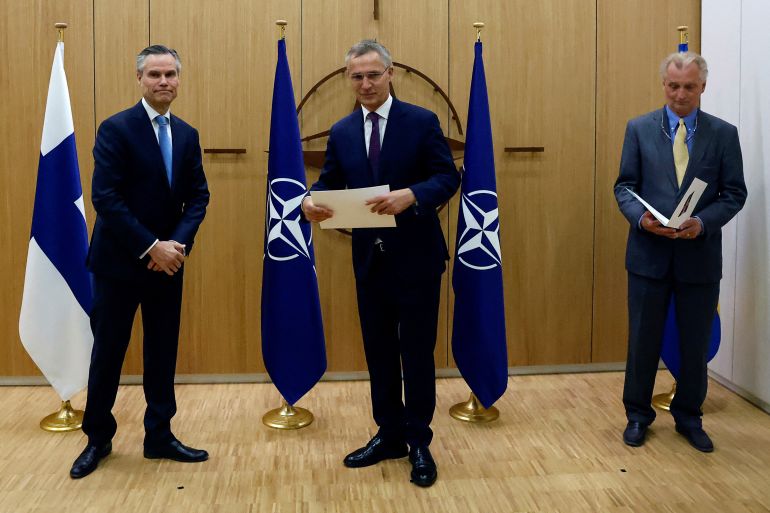Will Turkey block Finland and Sweden from becoming NATO members?
While President Erdogan has expressed his discontent, Washington and the alliance remain hopeful that divisive issues can be resolved.

Sweden and Finland began their NATO membership application processes earlier this month, as Turkish President Recep Tayyip Erdogan made it clear that he opposed the move.
Ankara is out of step with the rest of the alliance’s member states, which back NATO expansion as Russia’s war on Ukraine rages.
Keep reading
list of 4 itemsRussia cuts off Finland gas flows over payment dispute
Russia to cut gas supplies to Finland on Saturday: Gasum
PKK central to Turkish opposition to Sweden, Finland joining NATO
Ultimately, all 30 members must vote unanimously in favour of the historically neutral Nordic nations if they are to join the Washington-led group, so Turkey could – in theory – block an application.
“Turkey has every right to block Sweden and Finland’s ascension to NATO,” Ahmet Erdi Ozturk, associate professor in politics and international relations at London Metropolitan University, told Al Jazeera.
However, such a position would be costly as NATO members would likely approach Turkey as a problem child moving forward.
“It is hard to see Turkey’s future position since it is mostly based on domestic political developments. We should remember that Erdogan has been doing these policy changes to win the next election,” said Ozturk.
Murat Ersavci, a former Turkish ambassador to Ireland, Oman, Australia and Belgium, told Al Jazeera that Ankara does not oppose membership for Sweden and Finland per se, but has reservations.
Erdogan has accused Sweden and Finland of having an “open attitude towards terrorist organisations”, in reference to the Kurdistan Workers’ Party (PKK), which Ankara considers a terrorist organisation.
Turkey also says the two Nordic countries have failed to extradite suspects it wants.
And Ankara remains angry over Sweden’s 2019 decision to freeze arms sales.
‘Nothing to do with appeasing Russia’
One of Russia’s stated reasons for invading Ukraine was to stop NATO expansion, and Moscow has threatened Finland and Sweden with a vaguely worded “response” since they made their NATO ambitions clear.
“Turkish reservations have nothing to do with any sort of appeasement towards Russia,” said Ersavci.
Turkey has historically advocated for NATO enlargement, he added.
“Turkey has always been strongly in favour of NATO enlargement, as seen with the Baltic states, Poland, Hungary, Romania, Bulgaria, as well as Slovenia, Slovakia, Montenegro, Macedonia, Croatia, Albania and even Georgia. However, the situation is now different,” he said.
“There is a very strong public perception in Turkey that Sweden is assisting Turkey’s enemies, and this exerts huge pressure on the government,” said Ersavci.
However, he said Ankara perhaps should have engaged in a private diplomatic process to address its reservations before going public and sparking a global controversy.
The alliance now finds itself in a difficult position.
On one hand, Sweden, Finland and the vast majority of member states are keen to fast-track the applications. On the other, Turkey appears intent on stalling the process over national interests, at least temporarily.
“Turkey remains a fairly influential member within NATO,” Garret J Martin, lecturer and co-director of the Transatlantic Policy Center at American University, told Al Jazeera.
“Its geopolitical position makes it a very valuable player while the second largest standing military force in NATO, behind the United States, makes it a potential contributor to the collective defence of the alliance.”
What next?
Washington and NATO officials have said they expect Turkey’s issues to be resolved, even as Ankara’s rhetoric remains tough.
Despite recent developments, experts believe negotiations might proceed more quietly moving forward.
“The next step is likely to be a flurry of behind-the-scenes diplomacy, and international pressure, to convince Turkey to quickly remove the roadblock. Sweden and Finland will seek to placate Turkey, but we can also expect the US and the EU to play a leading role in this pressure campaign,” Martin said.
“After all, both have some leverage over Turkey, be it through [Washington’s] sale of military equipment or the [EU’s] provision of aid as part of the 2016 migration deal.”
Meanwhile, a sense of urgency is growing amid the Ukraine war and as the alliance prepares for its Madrid summit in late June, where a united front is essential.
“The most likely outcome remains Finland and Sweden joining the alliance very soon. Erdogan is a transactional leader, and the costs of blocking the two Nordic countries – deeply angering Western allies – would far outweigh the benefits in terms of domestic support,” said Martin.
Meanwhile, several observers have said Turkey is using this particular moment for leverage.
“Erdogan also briefly blocked in 2009 the nomination of Anders Fogh Rasmussen as NATO’s secretary-general, before relenting after receiving a prize in a high-level appointment for a Turkish official in the alliance,” said Martin.
With this in mind, NATO might again be willing to make reasonable concessions to Turkey to overcome this temporary encumbrance and proceed with the application process.
“Since the rest of the alliance is welcoming Finland and Sweden with open arms, there is clear political will to overcome this temporary roadblock,” Martin said.